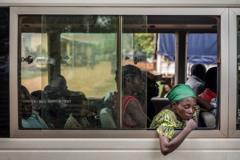In an unexpected twist in US immigration policy, many refugees from various corners of the globe are stuck in limbo while the Biden administration has opened its doors to a select group of white South Africans, referred to as Afrikaners, claiming they face persecution. While this move has sparked controversy, particularly from those like Pacito, a refugee from the Democratic Republic of Congo (DRC), it has highlighted significant disparities in how refugee applications are handled.
Pacito and his family faced abrupt cancellation of their flight to the United States, mere hours before departure, when the Trump administration unexpectedly suspended all refugee resettlement programs in early January. The family, having prepared for their new lives by selling possessions and moving from the DRC—a country rife with violence and instability—now find themselves in a precarious situation in Kenya, struggling to make ends meet.
As Pacito expressed, “It’s not fair,” referring to the 120,000 refugees who had completed the necessary vetting processes only to see their hopes dashed while Afrikaners received expedited processing. The stark contrast in the treatment of refugees has ignited discussions about fairness and equal treatment under the law. The Trump administration’s focus has shifted dramatically with policies that seemingly prioritize specific nationalities over others—especially as it continues its campaign of “America First,” which has included cuts to foreign aid and stringent immigration measures.
Adding fuel to the fire, the US welcomed a plane carrying fervent supporters of former President Trump's controversial claims. His assertions of a "genocide" against white South Africans have drawn scrutiny, and many experts dispute the validity of such claims. They highlight significant issues in South Africa, where a small percentage of the population—primarily white—controls much of the land. Critics argue that Trump’s decision to prioritize Afrikaners signals a dangerous precedent in refugee politics, especially as it comes at a time when countless others are being overlooked.
The plight of families like the Hammad family from Gaza, forced to seek refuge in Egypt, mirrors the struggles faced by Pacito’s family. With ongoing tensions and conflict creating obstacles to safe resettlement, many are questioning the consistency and fairness in how refugee statuses are awarded. “What about the Palestinians?” Amjad Hammad asked, reflecting a broader concern as many voices call for equal treatment for all refugees facing persecution.
While Trump has defended his policies as necessary for protecting American interests, the echoes of desperation from families like Pacito's underscore the need for a more equitable and fair refugee system in the United States. “I can’t go back,” Pacito lamented, leaving him and his family caught in a harrowing uncertainty, longing for a future they can no longer envision comfortably.























